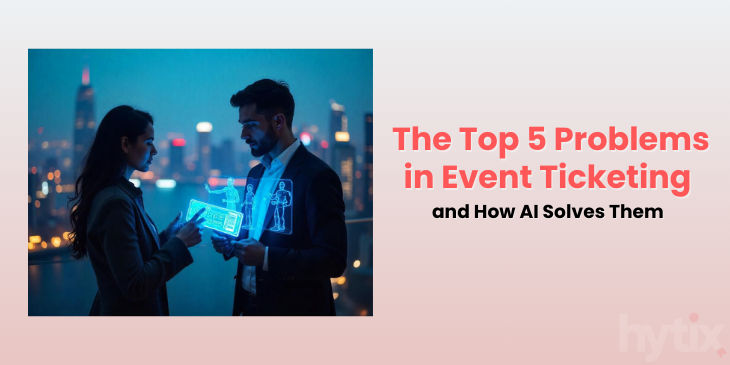Contents
The event ticketing industry has experienced significant transformation over the last decade, but the real revolution is happening now with the integration of artificial intelligence (AI). As technology advances, the use of AI ticketing system has become a game changer, enhancing efficiency, personalization, and customer experience. AI is redefining the ticket sales experience for organizers to analyze their needs as per the event requirements.
In this article, we discover the problems in event ticketing systems and how AI and ML can resolve the overall event ticketing process. AI and ML innovations are reshaping the ticketing landscape, and what it means for event organizers and attendees.
Role of AI in Event Ticketing
Event ticketing has always been a critical aspect of the event management industry. However, a traditional system of event ticketing often struggles with challenges such as overbooking, scalping, and inefficiencies in handling large-scale events. This is how AI plays a key role in revolutionizing the event ticketing process.
Key terms like AI ticketing systems, artificial intelligence tickets, and automated ticketing systems represent the backbone of this transformation. By employing machine learning (ML) algorithms and real-time data analytics, these systems ensure smoother, smarter, and faster ticketing processes.
The Evolution of Event Ticketing: From Manual to AI-Driven Systems
The journey of event ticketing reflects the broader transformation of industries adopting cutting-edge technologies. Initially, tickets were physical items, requiring significant manual effort to print, distribute, and sell. With the rise of the internet, online event tickets gained popularity, offering convenience and accessibility. However, even digital ticketing faced challenges such as scalping, fraud, and inefficiency in handling high-demand events.
AI has emerged as the solution to these issues. The integration of AI ticketing systems leverages powerful algorithms and real-time data analytics to optimize ticket sales, improve customer satisfaction, and ensure seamless event experiences.
Fraud and Counterfeit Tickets
One of the most significant problems plaguing the ticket industry is fraud. Counterfeit tickets and unauthorized reselling are rampant, leading to financial losses and frustrated attendees.
How AI Tackles Fraud
AI ticketing systems use machine learning algorithms to detect patterns and anomalies that indicate fraudulent activities. These systems analyze user behaviour, payment methods, and ticketing patterns to flag suspicious transactions in real-time. By implementing blockchain technology, an AI-driven event ticket system ensures secure, tamper-proof tickets, reducing the risk of counterfeiting.
For example, platforms integrating AI and ML ticketing systems can validate tickets using unique QR codes or blockchain-based smart contracts. This ensures that only genuine tickets are used for entry, enhancing trust among buyers.
Inefficient Customer Support
In traditional ticketing systems, addressing customer queries—such as issues with ticket purchases or refunds—can be slow and cumbersome. This inefficiency often leads to dissatisfied customers.
How AI Enhances Customer Support

AI-powered tools like Chat-GPT have revolutionized customer service in the ticketing industry. Chat-GPT ticket support systems provide instant, 24/7 assistance, addressing common queries such as event details, refund policies, and troubleshooting. An automated ticketing system ensures that customers get timely responses, enhancing their overall experience.
By implementing chatbots, AI ticketing systems improve communication and minimize the workload on human agents. These systems can handle thousands of inquiries simultaneously, ensuring a seamless support experience for users purchasing online event tickets.
Dynamic Pricing Challenges
Setting the right price for event tickets is a complex process. Overpriced tickets may deter buyers, while underpriced tickets can result in revenue loss for event organizers.
How AI Optimizes Pricing
AI in events introduces dynamic pricing algorithms that analyze market demand, historical data, and competitor pricing to set optimal ticket prices. These systems can adjust prices in real-time based on factors such as ticket demand, time remaining until the event, and external market conditions.
For instance, an AI ticketing system can identify peak demand periods and increase prices, accordingly, maximizing revenue. Conversely, it can lower prices to encourage sales during slow periods, ensuring all tickets are sold efficiently.
Poor User Experience in Online Platforms
Navigating clunky, outdated ticketing software can frustrate potential buyers, leading to abandoned transactions and lower sales.
How AI Improves User Experience
AI-driven ticketing software enhances user experience through personalized recommendations and intuitive interfaces. Machine learning algorithms analyze user preferences, browsing behaviour, and purchase history to suggest events that match their interests. For example, when users browse for tickets, the AI ticketing system can recommend similar events or exclusive deals tailored to their preferences.
Additionally, AI tools ensure smooth navigation and faster checkout processes, reducing the likelihood of cart abandonment. This personalized approach not only boosts ticket sales but also fosters customer loyalty.
Inefficient Event Planning and Marketing
Event organizers often struggle with planning and promoting events effectively, leading to low attendance and wasted resources.
How AI Transforms Event Planning and Event Marketing
AI streamlines the overall process of event ticketing from event hosting and scheduling to attendee management. AI-powered tools analyze historical data and market trends to identify the best dates, venues, and pricing strategies for events. For example, an AI ticketing system can suggest optimal dates based on audience availability and competitor events.
In event marketing, AI-driven systems craft targeted campaigns that reach the right audience. By analyzing demographic data and user behaviours, these systems create personalized marketing messages that resonate with potential attendees. Moreover, AI-powered analytics tools measure campaign effectiveness in real time, allowing organizers to make data-driven adjustments for better results.
The Future of AI in the Ticketing Industry
AI and ML ticketing technologies are not just solving current challenges but also paving the way for future innovations in the ticketing industry. With the evolution of AI, we can expect even more innovative features of event ticketing, such as:
Precise Analytics: AI technology helps to deliver more predictable event analytic reports with ticket sales, social media marketing trends, and others.
Voice-Activated Interfaces: AI-driven ticketing software that allows users to book tickets using voice commands.
Enhanced Security Measures: Advanced fraud detection systems leveraging biometric verification.
By adopting AI ticketing solutions, event organizers can offer a seamless, secure, and satisfying experience to their attendees, while optimizing operations and maximizing revenue.
Conclusion
The integration of AI in the ticketing industry is transforming how events are planned, marketed, and managed. From combating fraud to enhancing customer support and optimizing pricing, AI-driven systems address the most pressing challenges in the industry. Whether through automated ticketing systems or advanced analytics, AI tickets are shaping the future of events.
For event organizers looking to stay competitive, embracing AI ticketing systems is no longer optional but essential. With solutions ranging from AI for event planning to ChatGPT ticket support, the possibilities are endless. It’s time to leverage the power of artificial intelligence to revolutionize your event ticketing process and deliver unparalleled experiences to your attendees.
